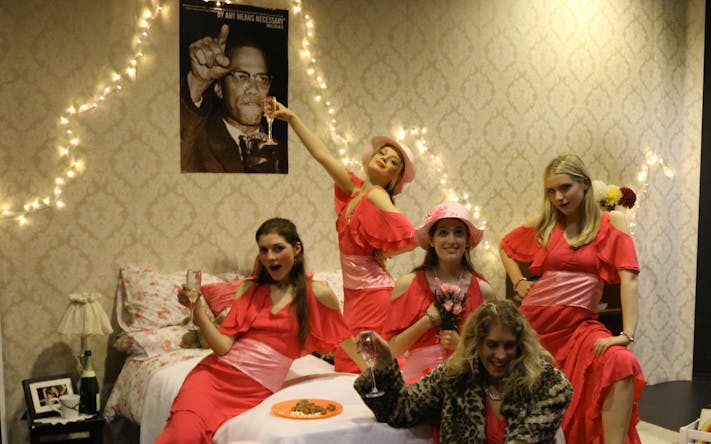At a smart wedding reception in Tennessee, five women escape the festivities for a period of sisterly bonding in the bride's sister's bedroom. As the evening wears on, the women get to know each other and find they have more in common than a dislike for the off-stage bride – with friends and relatives like these, who needs enemies, I found myself thinking.
American playwright Alan Ball's 1993 Five Women Wearing the Same Dress is billed as a comedy, though laughter from the audience of 70 was not prolific. Co-director Lara Marks told me beforehand how Mr Ball has placed a strong emphasis on the female voice and the significance of female expression. Well yes, but these women seemed on the whole to enjoy their lolling around complaining about men as they ogled them through the window. They and the sole male character walk a tightrope between autonomy and commitment, struggling to support one another.
I felt that some of the first half dialogue lacked freshness – was hackneyed even - and its bitchiness tended to be short on wit, bar some sharp one-liners. But later the interest level of the material moved up a notch and towards the end the pitch was ratcheted up further, even though Mr Ball's chosen means was a lurch into melodrama, and his chosen plot point (which I won't disclose) somewhat predictable.
The writer has been most faithfully served by Gold Thread Productions in a bare month of rehearsal time. The set jutted out into the audience space, and set designer Mira Liu's dressing tables, Persian rug, comfy queen-size bed and other bedroom paraphernalia betokened a devoted attention to visual detail, unusual for a low-budget student production. This impression was compounded by the shocking pink of the eponymous dresses – delightfully apt. Co-directors Catherine Dimitroff and Lara Marks have made fluid use of every square metre of that acting space. Appreciating their play is dialogue-heavy and that the bed might become an over-used point of rest for the cast, they have injected energy via the movement of every cast member, in its finesse again exceptional in student drama.
So who are our five women? We have Meredith ("I'm just thrilled to be back at home with my Fascist parents"), the bride's acerbic, pot-smoking sister of the bride, brash on the outside but brittle. Lucy McIlgorm gives her a nicely louche look and sound, switching moods easily so we never heard the gears crunching. Frances ("I don't smoke, I'm a Christian") is the youngest of the bridesmaids and a naïve fundamentalist Christian (Mr Ball's reminders of the fact are a mite overdone) who is saving herself for marriage. Nicole Jacobus captures her innocence squarely, even if her reaction acting is once or twice short on variety.
Georgeanne ("I may be a slut and I may be a bitch, but I do have some standards") is apparently the most troubled of the five - and the drunkest. Weighed down by marriage woes and the ironically named Tommy Valentine, Phoebe Mallinson gives this struggling character heart; and how refreshing that she never overplayed the drunkenness. Trisha ("I have never met a man who looked at me and saw anything but his own ego") is a 34 year-old cynic, veteran of having bedded close to a hundred men (the novelist Georges Simenon claimed to have slept with 10,000 women). Co-director Lara Marks doubles as this knowing sophisticate, and I admired her lithe energy and particularly her expression both of jaded sexual appetite and of something approaching motherliness towards her younger friends.
Mindy ("I look like a hooker from the Twilight Zone"), is the last of the friends to appear, the groom's cheery, jokey lesbian sister, and I was sorry Mr Ball didn't give her rather more to say and do. The character is distinctive as suggesting a liberated individual where her comrades seem all but overrun by peer pressure and broken promises. Lucia Proctor-Bonbright most skilfully combines a casual attitude with grounding authenticity. This is an endearing creation, acting of a high order. Tripp, in pink bow tie and silk shirt, a rogueish charmer, is nonplussed by the tough cookie Trisha who declines being turned by him into something she does to wish to be. It's not easy for an amateur actor to come on cold in the last 15 minutes and hit the floor running, but that's just what Hasan Al-Habib achieved in a smoothly effective cameo. The cast's Southern US accents were uniformally impeccable.
Gold Thread have squeezed every drop from their material. Their intensity and dash deserve full houses for the rest of the week.




